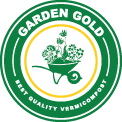- Garden Gold
- Become A Dealer
Become A Dealer

Grab our electrifying discount on your inaugural purchase.
What is vermicompost?
Vermicompost is a nutrient-rich organic fertilizer and soil conditioner produced through the decomposition of organic matter by earthworms. It is also known as worm compost or worm castings.
What are the benefits of using vermicompost?
What types of worms are used in vermicomposting?
The most commonly used worms are Red Wigglers (Eisenia fetida) because they thrive in organic material and reproduce quickly.
What materials can be used for vermicomposting?
How do I maintain a vermicomposting bin?
How long does it take to produce vermicompost?
It typically takes 2-3 months for the organic material to be fully converted into vermicompost.
How do I harvest vermicompost?
How do I use vermicompost?
Can vermicompost be used for all plants?
Default AnswerYes, vermicompost is beneficial for a wide range of plants, including vegetables, fruits, flowers, and ornamental plants. It provides a balanced supply of nutrients and improves overall soil health. By following these guidelines, you can successfully manage a vermicomposting system and enjoy the many benefits of this natural, sustainable practice. For more information or to purchase high-quality vermicompost, visit Garden Gold Vermicompost Manufacturing based in Mogar, Anand, Gujarat.
